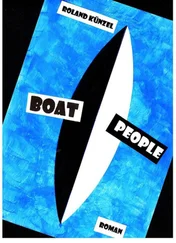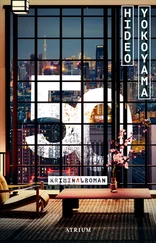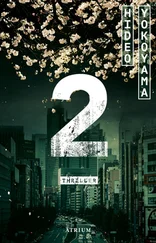Minato ward and Shinagawa ward converge by the Grand Meridien Hotel. Tokyo’s front line. I get off at Odaiba Station, walk across West Park Bridge and enter Symbol Promenade Park. The heart of Odaiba. A hollow surrounded by semi-futuristic buildings.
No rain. Not yet. Is it coming or not?
I find a seat and let the morning chill seep in. Through my coat and my jeans.
Does this even pass for a seat? More like a stone frustum. A man-made stalagmite with the head cut off. There’s more than one. Stumps forming a fairy circle around a solitary trash can.
I fantasize. The trash can is the Round Table—the stumps are chairs for the Knights of the Round. What a stupid fantasy.
It’s Christmas Eve morning and everyone’s at home, getting ready for Christmas Eve night or whatever. The real Eve. No one’s deranged enough to come sit here at this hour. Except, well, me.
Wasn’t the Holy Grail all about slaying dragons?
Maybe I’ve got it wrong. I have to admit—the cultural heritage of Western Europe isn’t really my strong suit. I can tell you this, though. I’m no dragon-slayer. It was a lucky dragon—a creature we’d seen on a movie screen—that brought my first girlfriend to me. And this fact, this brilliant fact, has been a factor in my life ever since. Dragons have had a special place in my heart. That in mind, I think I need to reconsider my presence at the Round Table. I’ll stand against the Knights if I have to. Yeah, my fantasy’s all wrong. I’m on Team Dragon.
I mean, this creature—or creation, whichever—let me read my first girlfriend like a dream.
My ass is freezing.
On this headless stalagmite.
This lifeless piece of stone. Wonder if I can warm it up.
Think warm thoughts.
Pray for warmth.
I’m asleep before I know it.
Christmas Eve morning, in the heart of Odaiba. I start dreaming. Everything that had been swirling around in my head suspends. In my sleep, I can see. A vision. For the first time in a long time, everything’s clear—in focus. Almost like the dreams I had when I was ten or eleven. I’m in the dream—the dream world floods my senses.
I wonder if the Japanese language can do justice to my dreams now.
Have I got any better at the language of dreams?
Only one way to find out.
I was in a room . I was there—in the dream. Strange. I could see my own body. My whole body. In the real world, I can’t do that. All I can see is my hands, my arms up to my elbows, my belly, my legs. I’m a character in this world . Not some viewer, outside of it all. I’m a part of it—under its control.
Seeing my whole body proves it.
In that moment, I’m in that world—that “room”.
Everything’s fuzzy. The edges blur. What’s going on? Take a good look. OK, where am I? At a writing desk. Sitting in an armchair… A cabriolet?
I’m leaning back with all my weight.
And I’m watching myself lean back. So where am I watching from? From what perspective? Hovering just above ground. Almost like a guardian angel, watching over myself.
After a while, the line between my two selves vanishes.
Then—all of a sudden—I’m looking at the “room” through the eyes in the head of the body in the chair. Leaning back into the cabriolet.
The ceiling hangs low.
It vaults… Or curves? I need to check it out. I spin around—I guess this cabriolet can spin. Or maybe it’s not a cabriolet.
There’s a bed across from the writing desk. A single (not a twin, not a double). The linens are fresh, unwrinkled. The work of professionals, no doubt. At the head of the bed, by the headboard, the ceiling curves down the wall.
I get up to take a closer look. No wall. It’s like the ceiling goes down to the floor. (Down to the headboard?) There’s a window there. Covered by curtains. The curtains are thick—like shrouds. I reach out to touch them. They feel smooth, like curtains should. I pull them back to find another set of curtains. Lace, this time.
Behind that?
Just darkness.
I feel beyond the lace. There’s nothing outside this window. I pull back the second set of curtains. The window’s boarded up. Nothing to see.
That sort of thing normally scares the shit out of me. But, in the dream, I have no fear.
OK, the bedside window’s no good. What about the others? Where are the others?
I take a look around the “room”. Nothing else you could call a window.
Ceiling, wall, floor. That’s pretty much it.
What is this place?
A hotel, I bet. What else could it be?
Over time, the “room” takes the shape of a room. But there’s no wall by the bed. That stays the same. The slope is like the nose of a bullet train. I go back to the writing desk, but don’t sit down. I look at the desk. Something’s off. Way off. Dust—the desk is covered in two or three centimetres of dust. What gives?
On the right side of the table, there’s a TV. Under that, a cabinet. On wheels. Wait—maybe it’s not a cabinet. More like a safe. (The longer I stare at it, the more it starts looking like a safe.) It’s got a sticker on it. There’s some writing on it. A clue? Instructions? It looks like instructions—like how to use a life jacket or something. For emergencies, like if there’s a fire in the hotel—to escape. There’s something written in Japanese.
It says: OPEN ONLY IN EMERGENCY. Then there’s an inspection date and a signature.
There’s more writing. Besides the Japanese. English and… Chinese? The characters look like the kanji I know, but different. Simplified Chinese? I can read some, not others. Not sure what it says.
I look back at the desk and the dust is even thicker now.
I brush it off.
Then I see it. There’s a CD. Didn’t expect that. How thin is this case? I feel like a forty-niner discovering gold dust. I take the CD in my hands—lovingly.
It has a yellow jacket. There’s a black man on the cover, holding a tenor sax. “Sonny Rollins with the Modern Jazz Quartet.” Is that the title? Band name? Both?
Sonny Rollins.
I flip the case over. Thirteen tracks in all. “The Stopper”, “Shadrack”, “On a Slow Boat to China”.
That’s where I wake up.
Violently.
I’m cut out of the picture. The dream spits me out.
I’m shaking. From the cold. Back on my stone stump in the middle of Symbol Promenade Park.
We age, but we’re not alone. The same goes for our city. So—how has Tokyo got older? How has it grown up? These are the kinds of questions we’ll tackle in “Tokyo Chronicle”, a new series launching in our next issue.
In the meantime, here’s a little taste of what we’ve got in store—a teaser, if you will. Kaku Nohara kicks things off with a short story about his Tokyo, circa 1985. Before we get to his story, just a few lines about where the world was in 1985.
AIDS landed in Japan. Gorbachev was picked to succeed Chernenko. Aug. 15: PM Yasuhiro Nakasone paid a visit to Yasukuni Shrine, in an official capacity. Race riots raged in South Africa. Japan Airlines flight 123 crashed near Mt. Osutaka, Gunma Prefecture. In Ibaraki, EXPO Tsukuba 1985 ran for 184 days. The New Entertainment Control Law went into effect. Oct. 16: Hanshin Tigers named Central League champions.
THE PEPSI WARS
By Kaku Nohara
We’re all ten years old. Old enough to taste the difference. And you can buy Coke at any convenience store… Really, where’s the fun in that? We’re on the hunt for Pepsi-Cola .
Pepsi’s different. Premium. A rare brew manufactured in underground power stations.
I issue the order:
—Fall in!
Читать дальше












